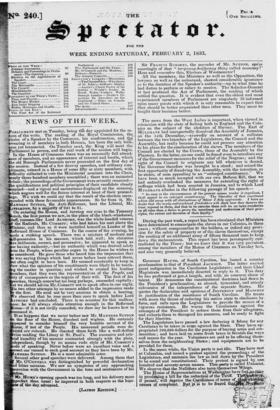NEWS OF THE WEEK.
ARMAMENT met on Tuesday, being the day appointed for the re-. urn of the writs. The reading of the Royal Commission, the' hoice of a Speaker by the Commons, his confirmation, and. the- wearing in of members in both Houses, has been the only busi-,. ss yet transacted. On Tuesday next, the King will meet .the ailiainent in person, and the real work of the session will begin. In the House of Commons there was an unusually full attend- ee of members, and an appearance of interest and bustle, which e old Borough Parliaments never presented on the first day of e session. • Instead of a few drowsy speeches, and ordinary com- ments, uttered in a House of some fifty or-sixty members, with culty collected to vote the Ministerial nominee into the Chair, niu'ly three-hundred-members:assembled ; there was an animated ebate ; the proceedings of the Government were severely censured— e qualifications and political principles of their candidate closely. rted—and a vicrour and earnestness displayed on the occasion, hich augurs well for the future interest at least of their preeeed- gs. We wish we could say that the result of the election cone- . nded with these favourable appearances. So far from it,- Mr. • ANNERS SUTTON, the Anti-Reformer, beat the Liberal, Mr.
firtztoN, by, a majority of to. 31. • On entering the House, and turning our eyes to the Treasury ench, the 'first person we saw, in the place of the black-whiskered, , yeoman-like Lord Ar.rskouP, was :the white-headed veteran the Radicals, Mr. Comsnivr; who had .taken his seat aboVe the Mister, and thus as it were installed himself as Leader of the erornied House of Commons. In the course of the- evening, he " ade a -striking speech. There was a mixture -of modesty and lf.possesSion in his manner, .teld..well; his elocution s deliberate, correct, and persuasive; he :appeared M speak: as e having authority,but an authority which was derived Solely om the People, whose peculiar organ in the House he wishes to considered.. He gave those-who heard him the impression that- was saying things which had never before been uttered there, t often ought to. have been. He seemed constantly to keep in ew. what the 'Opinions of his constituents were likely to be touch- g the matter in question; and wished to remind -his brother embers, that they were the representatives of the People, and ly of eOriSequetice as the Organs of -their will.. The first of his eches, though somewhat too long perhaps,- succeeded capitallY: t we shoUld advise Mr. Ceiperr not to speak often in one night. is two. other attempts by no means added to the impression made -the first. He need not be very anxious to obtain a. hearing.. e observed that he rose more than once to speak before Lord , LTHORP had coneluded. There is no occasion for thil restless-: s; :be will always obtain attention enough in the Reformed; ouse,-L-if it is not civilly conceded, wedare say he knows how to . mmand it.
soliappena that We wirer before-sa* Mr. MANNERS SUTTON the floor of the House, disrobed and wigless. He certainly peered .to consider, himself the very humble servant of the e, if not of the People. His measured periods were de- ernd ore,rotundo. He' chanted them forth like a well drilled vine'reading' the Litany at St. Paul's. The excessive and arti- ial humility of his manner contrasted strongly with 'the plain,'" dependent, though by no means rude style of Mr. Coimarr's ode of speaking. Never before were an excellent voice and a, rect ear turned to such good account as they have been by Mr. ANNERS SUTTON. He is a -most' achnirible actor.
Several other good speeches were delivered. Among them that O'Col■rivzia. was distinguished, by powerful declamation d bitter sarcasm. . We saw - no symptoms of any approaching exion with-theGovernment in the tone and sentiments Of his tion. . .
Mr. Humes opening speech was too, long, and his delivery more rfect, than usual : he improved in both respects as the busi- 4s ibe daY, advinixd. . Sir FRANCIS BURDETT, the seconder of Mr. SUTTON, spore sneeringly of that "twopenny-halfpenny thing called economy!" Hear and remember this, Electors of Westminster!
All the members, the Ministers as well as the Opposition, the lawyers as well as the unlearned, showed considerable ignorance as to the duration of the Speaker's authority—up to what time he had duties to perform or salary to receive. The Solicitor-General at last produced the Act of Parliament, the reading of which settled the question. It is evident that even the:oldest and most experienced members of Parliament are singularly ill-informed upon many pointS with which it is only reasonable to expect that they should be better acquainted than other men. They must be taught their business better.












